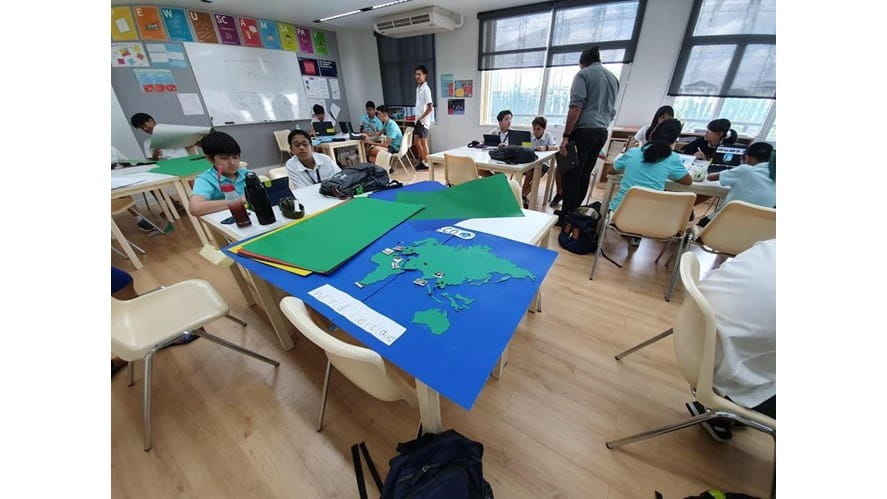We use cookies to improve your online experiences. To learn more and choose your cookies options, please refer to our cookie policy.

It was a great Year 6-9 Project Week, with students working on a huge range of different animal welfare, education, fair trade, homelessness and sustainability projects, many of them created and led by students.
What a fantastic Project Week at St Andrews International School Bangkok, with Year 6-9 students working together on a huge range of different animal welfare, education, fair trade, homelessness and sustainability projects, many of them created and led by students.
Below are write-ups from Ms Sarah, who participated along with Year 6, and from the STA Times, one of the projects that spent the week reporting on other projects.
“Last week’s Project Week at High School was a resounding success with all Year 6 pupils taking on an active role within their group. Each project was different, aiming at tackling ‘real world problems’ from making a fashion statement using clothes made from trash to exploring the sustainable effects of solar panels. Whilst some children developed mosquito traps in an attempt to reduce the harmful effects of malaria and dengue, others explored fair trade and sustainable products to design, create and market their own beauty products.
The students worked within groups comprising of pupils from Years 6, 7, 8 and 9. Some of the projects enabled students to learn and use new technical skills, using specific pieces of equipment to measure light and sound, or exploring new tools and machinery in the DT workshops, or using different computer programs to produce technical drawings, create videos or code. While other projects challenged the students to gain new knowledge or push themselves to meet new expectations.
In addition to learning new skills, all the projects aimed to promote and develop the pupils’ 21st century skills - reasoning, generating ideas, discussion, prioritising, delegation, perseverance and determination. Our students enjoyed working with different pupils, getting to know some of the High School teachers and familiarising themselves with what will soon be their new campus.
At the end of the week there was a showcase for students and parents, to show off what they had learnt and produced, providing an interesting opportunity to present their ideas to a real audience. It was great to hear their new found knowledge and to talk enthusiastically on a range of topics.”
Ms Sarah (6S Class Teacher & Primary STEAM Coordinator
“Students are inspired to be the best they can be, enabling them to become responsible global citizens.”
Sound familiar? That’s from our school’s mission statement.
If we are to become “responsible global citizens”, we cannot stand back and do nothing about climate change.
As global citizens, it is our responsibility to ensure we lead sustainable lifestyles, allowing us to meet our needs “without compromising the ability of our future generations to meet their own needs.” (Brundtland Report, 1987). Climate change is becoming a more pressing matter day by day; according to a recent report, with the current rate of climate change, there is a “high likelihood that human civilisation will come to an end” by 2050.
As global citizens, it is our responsibility to act on reports like these. Meat Free Monday is a great way to promote sustainability, as well as showcasing that St Andrews is moving toward becoming a greener school, fostering an environment that allows students to thrive and truly become global citizens. As Greta Thunberg said: “Change is coming, whether you like it or not”.
We will be piloting Meatless Monday on Monday 17/6 and Monday 24/6.
There are several reasons why eating meat and dairy products is harmful to our environment. By not eating meat for one meal a week, you can already contribute to reducing these effects. Over the next five days we will share some of the consequences of producing meat and dairy products:
14.5% of global greenhouse emissions are caused by animal agriculture. Especially cows produce a high level of methane, which traps 100 times more heat in the atmosphere in the atmosphere than carbon dioxide, thus greatly contributing to climate change.
Producing meat and dairy requires 83% of farmland and contributes to 60% of greenhouse gas emitted by agriculture. But they only provide 18% of all food calories and 37% of protein.
70% of the deforested areas in the Amazon rainforest have been used as pasture for animal grazing. Also, soybean production is mainly used to feed livestock; 1.2 million hectares of rainforest were cut down between 2004 and 2005 to produce more soybeans to satisfy the growing demand for meat.
Globally, humans drink roughly 20 billion litres of water daily. In comparison, dairy products and cows reared for meat require around eight and a half times that amount. In fact, 27% of the global “water footprint” is related to animal agriculture.
According to researchers, a massive reduction in meat consumption is needed to avoid ‘dangerous climate change’; in western countries, this reduction has to be at least 90%.
- The Sustainability Group
As you can see from the Calendar below, we have a very busy few weeks ahead of us, with the PTG Summer Party and the Senior Prom this weekend followed by the High School Sports Awards and EXPO 2019 next week. I look forward to seeing you at these events.
Roo Stenning (roo.st@standrews.ac.th)
Head of High School